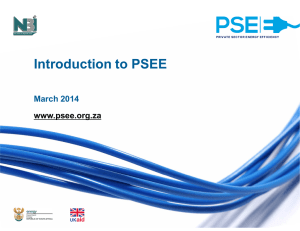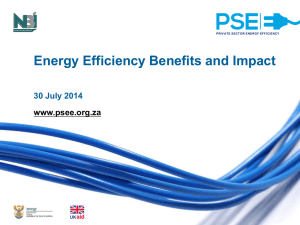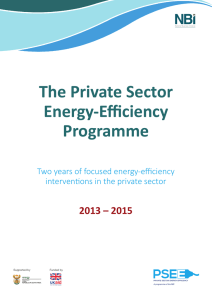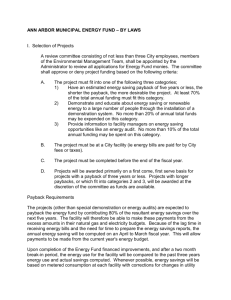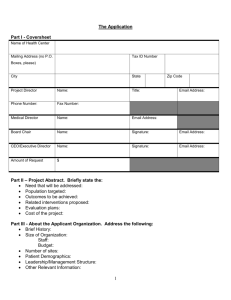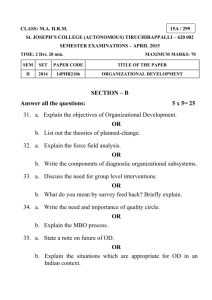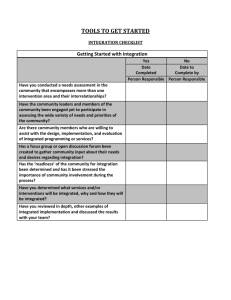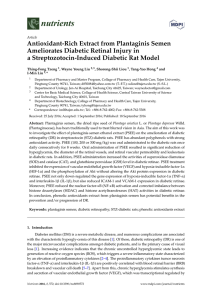The First Fuel Energy Efficiency Kevin Tarr-Graham
advertisement
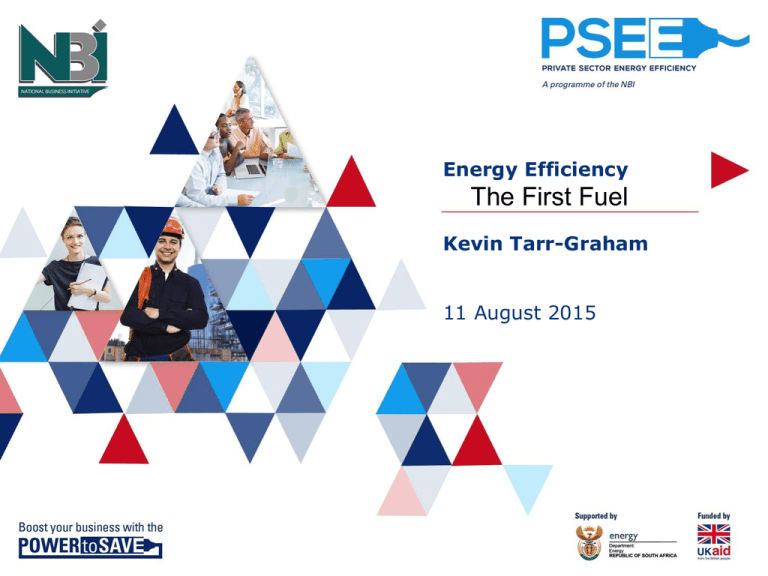
Energy Efficiency The First Fuel Kevin Tarr-Graham 11 August 2015 Overview Why Energy Efficiency is a priority Update on PSEE Key Interventions identified Case Study Examples Opportunities for new company engagement Barriers to Energy Efficiency Implementation for further work Copyright © PSEE 2014 Why Energy Efficiency? Cost of Energy (New tariff increases) » (2001 to 2008 = ~50%) (2008 to 2015 ~ 160%) total of ~ 200% since 2001 Supply and Demand » 10hrs blackouts/day for 20 days – Stage 1 = R20 Billion, Stage 2 - R 40 & Stage 3 = R80 The “first fuel” Competitiveness Reputation Policy Environment – National Energy Efficiency Strategy by 2016 : New targets to 2030 – New Regulations to be gazetted on Energy Management Plans & Reporting data – Carbon Tax and carbon emission reduction and reporting – Tax Incentives : 12L; 12 I; MCEP; Commercial and Development Financing PROGRESS UPDATE……… Outcomes against activities Numbers against revised targets 1. Awareness raising through remote support especially for small business 3000 people reached against a target of 2000 2. Training of small business 1400 people trained against target of 900 3. Site surveys for Medium size business 520 site survey completed and over 150 additional medium size contracts signed against revised target of 765 4. Strategic Energy Management with large companies ( many taking note of impending regulations in Energy Mgt, 12L and Carbon Tax 36 against a revised target of 35 large companies PROGRESS AGAINST OUTCOMES POTENTIAL SAVINGS IDENTIFIED AT 520 MEDIUM SITES Nr of savings opportunities 3 317 Potential annual energy savings 611 GWh Potential lifetime energy savings 7 472 GWh Potential lifetime carbon savings 5.5 MtCO2e Average payback period 2.3 years Estimated saving into grid capacity 195.8 MW 1 175 000 kWh per site or ~ R1. million savings KEY INTERVENTIONS IDENTIFIED………. KEY EXAMPLES OF INTERVENTIONS IDENTIFIED THROUGH PSEE SURVEYS Intervention Average payback period Operational measures 0.33 years Implementation of carbon and energy management system 0.89 years Ventilation 0.99 years Compressed air 1.46 years Process design and implementation 1.69 years Process instrumentation and control systems 1.88 years MOST RECOMMENDED INTERVENTIONS MOST RECOMMENDED INTERVENTIONS Intervention Payback period Process heating and cooling 2.1 years Lighting 2.6 years Renewable energy sources (primarily solar PV power) 6.9 years PSEE COMPANIES BY REGION Split of PSEE recommendations to date by technology, March 2015 Annual energy savings, GWh 60 50 40 30 20 10 0 The PSEE is delivering services to 36 large companies Chemical & Petrochemical Financial Intermediation Manufacture of Food Products Paper & Packaging Metals & Metal equipment Mining & Quarrying • Omnia • Engen • • • • • • • • • Mpact • Nampak Glass • Mogale Alloys • Atlantis Foundries • Aberdare Cables • Tronox • • • • • Non-metallic Minerals Post & Telecommunications Property & Real Estate/ Educ. Retail Trade Logistics & Transport related Construction • Afrisam • MTN • Vodacom • SA Post Office • Sun International (2) • Growthpoint Properties • UNISA • Woolworths • Mr Price • Transnet • Barloworld • Murray & Roberts Other • Bridgestone • Netcare Standard Bank First Rand Nedbank Liberty Distell Pioneer Foods Quantum Foods Woodlands Dairy BHP Billiton Exxaro Sibanye Gold Sasol Mining Richards Bay Coal Terminal • Royal Bafokeng Platinum Opportunities for new company engagement Small (Energy spend < R750k p.a.) › Remote Advice and guidance provided by: › Telephone › Website › Publications › Events & workshops Medium (Energy spend R750K & R45m p.a. ) As per small companies plus: Fully subsidised 4 day energy site survey delivered by thirdparty energy consultant (fully subsidised, c. R30k) Follow up implementation support * End September 2015 Large (Energy spend > R45m pa) As per small companies plus: Co-funded Strategic Energy Consulting of up to 60 days of support from third-party consultant (Up to ~R500k, 60% subsidised) On going relationship with account managers PSEE Offering to: Medium companies Initial site meeting • 1 week Contract completed and signed • 2 weeks (PVQ + bills) Scope of work developed and signed off •2 weeks Contractor on site •2–4 weeks Final report and presentation Barriers to EE Implementation • Awareness, Behavioural change – management, capacity and capability • Access to Finance : Public, Commercial, Development and Business Case • Technology Choice and Selection • Property – Tenant responsibility • Municipal revenue stream • Energy security and economic stress Saving Energy = Saving money THE ENERGY BUCKET •Diesel Electricity •Fuel Oil •Heat Recovery •Renewable Energy Deferred Maintenance Energy efficiency Education Efficient operations Lack of full operation understanding Man/ops Disconnect Old Technology Inefficient operations Improved Best Practices Publications 1. Manufacturing 2. Guide To Energy Efficiency Finance In South Africa 3. Chemicals Sector, Introducing energy savings opportunities for business 4. Take a load off SA’s power grid & the environment 5. Motors and Drives 6. Making the Business Case for Energy Efficiency 7. Lighting - Bright ideas for efficient illumination 8. High Temperature Industry 9. Retail Energy Management 10.Compressed Air, Opportunities for businesses 11.Energy Management 12.Better Business Guide to Energy Saving 13.Creating an Awareness Campaign 14.Heating, Ventilation And Air Conditioning (HVAC) 15.Refrigeration Systems - Guide to key energy saving opportunities THANK YOU Contact Details: Kevin Tarr-Graham Mobile: 061 0808589 Email: kevint@nbi.org.za Web: www.psee.org.za PSEE conference in Johannesburg on the 12th and 13th October
